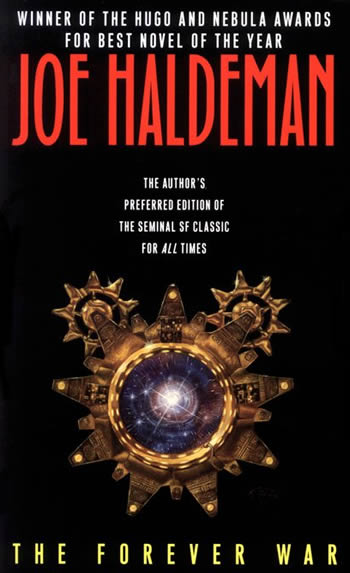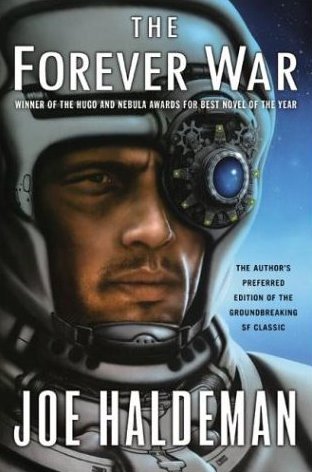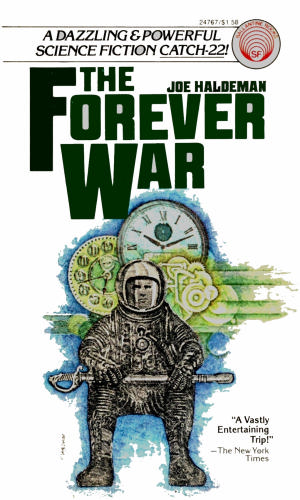The year is 1997 and the Earth is at war with the enigmatic Taurans. Our best and brightest have been drafted into UNEF, the United Nations Exploratory Force. Their training will be brutal, unrelenting, and rigorous, and half of them may very well die rather than graduate. Those who survive will be sent to fight in the farthest reaches of the galaxy, defending our fledgling colonies and the portal planets near the collapsars that make interstellar travel possible. Thanks to relativity and time dilation, these soldiers will skip through time, years and decades passing by back home while they experience days and weeks. Some will never go home. Some will go home to a world they don’t even recognize. This, then, is the story of the Forever War, and of William Mandella, who, despite all odds, lived through the entire duration.
The Forever War was first published as a serial in Analog, before being released in book format in 1974. Over the next two years, it won the Nebula, Hugo, and Locus awards, which is pretty much the Triple Crown of science fiction honors. It’s one of the great classics of military science fiction, for a great many reasons.

When we first meet our hero, everyman stand-in William Mandella, he’s still in training, learning eight silent ways to kill a man, including at least one involving an entrenching tool to the kidneys. He’s a semi-reluctant soldier, a draftee plucked from college after getting his Master’s in physics, his plan to get a teaching certificate interrupted by the war at hand. The military only wants the very best, those who stand out physically and mentally—the elite of a generation. And despite the fact that none of them have ever seen a Tauran, and have no idea what they look like or might have by way of internal organs, they’re still being trained to go for the kidneys. Several interesting things leap out in these first few pages: the military is willing to kill brain-wiped convicts for the purpose of training, the soldiers are required to curse out their training officers in what William considers a “less inspired” piece of morale boosting, and the bunks are assigned and coed. Not only are these soldiers required to sleep next to the opposite sex, they’re encouraged to sleep with them. This is the first sign that sex, and sexuality, will be a recurring theme in this book. In this version of 1997, Haldeman has offered up a world not too far removed from the early-to-mid ’70s, where the changes aren’t too outlandish and the scientific and social advances perfectly plausible for the genre.
The rest of the training period, in which our heroes are issued their armored combat suits and taught how to use them out on Charon (past Pluto), is violent, oft-fatal, and treated with an almost matter-of-fact acceptance by the author and the narrator. Not everyone makes it, and by the military’s standards, that’s normal and to be expected. Obviously, while a lot of time and money is invested in each of these recruits, there’s room for “acceptable losses” in order to turn out a few dozen well-armed killing machines. And for the survivors of the graduation exercise, there’s no time to waste. They’re immediately shipped off into the great unknown to encounter the enemy. It’s a horrible, nasty affair, made worse by the use of hypnotic conditioning that turns our heroes into crazed killers, spurred on by blatantly false images that owe more to ’50s-era schlock SF than any sort of reality. An experiment on the military’s part that clearly doesn’t work quite like they’d hoped, it leaves some pretty nasty mental scars on the survivors. (Results of the battle: one amputation, four deaders, fourteen psychotics.) But it’s our first actual face-to-face contact with the unknown, and we come out the victors. Yay us?
As the next section of the book begins, we’re informed that William’s been in the army for ten real years, though with relativity involved, it’s been less than two for him. It’s now 2007 back home, a decade flashing by in the blink of an eye. As he puts it, “Me, a twenty-year man, and only twenty-five years old.” Time dilation’s a pain in the ass, and it’s also the single greatest influencing factor in the book, so pay attention.
Haldeman’s a realist: when our first taste of space combat comes shortly thereafter, it’s incredibly swift and over in a heartbeat, and before we know it, we’ve won, but the ship containing our heroes is heavily damaged. William’s friend/regular bed partner, Marygay Potter, is wounded in the process, and here we see just how much she’s come to mean to him, and we also get an instance of his creative approach to solutions when he finds a way to keep her alive for the trip home.
And then it’s 2023, and what’s left of William’s original team is sent home. Twenty-six years have passed since he joined the army, and he’s ready to become a civilian again. A somewhat wealthy civilian, given the amount of pay he’s eligible to receive. Of course, the world’s changed a whole lot in that span of time. The world’s darker, more crowded, more violent, and has been on a wartime economy for decades. And, to the surprise of those coming home, a good third of the world is homosexual, something actively encouraged by many governments as “the one sure method of birth control.” (Something Mandella himself internally rejects as a specious argument.) In short, the world has moved on while he and the others were serving in the military, and there’s likely no real home for them anymore. (But the army would love to have them back, of course!)

This next portion of The Forever War, the period of time spent back on Earth, is of special note. As mentioned earlier, the entire book was originally serialized in Analog. This segment, entitled “You Can Never Go Back.” was rejected by editor Ben Bova for being too depressing. Haldeman wrote something that was a little less disheartening, and that’s the version which made it into the actual book. When Avon reissued the book in 1991, Haldeman finally had the chance to include his original story. I’ve seen them both, and taken both together and separately, they paint a fascinating picture.
In the “happier” version, William and Marygay spend a little time trying to acclimatize to the new world order, but fail to settle in. They’re misrepresented by the media, disenchanted by the idea of travel, and generally dissatisfied. After William’s mother dies due to lack of priority healthcare, he and Marygay reenlist, and that’s that. It’s a fairly short piece, presenting the world of 2023 fairly bluntly before moving on.
In the “real” version, Haldeman doesn’t hold back. Here we see that the world economy is based on food rations and calories instead of money, that getting any job at all is complicated and often fraught with illegality, and sudden violence is a way of life. William’s incredibly thrown off-balance when he learns that his own mother has taken a female lover, another sign of just how much things have changed in his absence. The world tour he attempts to take with Marygay Potter is brought to an end by culture shock, and their attempt to settle down is interrupted when raiders attack her family’s farm and kill her parents. Throw in the aforementioned death of William’s mother, and there’s very clearly nothing left for our heroes on Earth. They reenlist almost out of desperation, and thus begins the next stage of their military careers.
Culture shock and alienation, society moving too quickly for the returned veterans to accept, a media that can’t be trusted. Haldeman wrote this as a Vietnam allegory, and it shows in the details.

Thanks to his previous combat experience and seniority, William’s been promoted to lieutenant, whether he likes it or not. Sadly, this doesn’t last long at all before combat injuries take both him and Marygay out of commission. They’re both sent to Heaven, the new medical and recreation planet, which is designed to put them back together as best as science will allow (with fully functional, realistic prosthetics as needed) and separate them from their money while they’re still on the mend and on leave. Note that by this time, it’s 2189. Not only has William been in the military for nearly two centuries, but back pay plus compound interest have made him a billionaire. And thanks to time dilation, he’s still in the prime of his life. The vacation can’t last for long, though; soon enough they’re recalled to active duty, and given promotions. William’s granted the rank of major, and made into a company commander, something he doesn’t favor at all. And for the first time, he and Marygay are separated, sent to different postings. The chances of them ever meeting again are almost nil. It’s another tragic moment as William loses his last real link to his old life. The army is his home, now and forevermore. Or so it seems.
The rest of the book concerns William’s time as company commander, as he deals with people born centuries after him. He comes from a different time and a different culture, and he’s alienated both by upbringing and experience, and by rank. Worse yet (by his standards), he’s the only heterosexual around, ever since the entire world embraced “homolife.” It’s not presented as bad, or weird, or anything other than a fact of life. In fact, things have been turned around: now it’s the straight white male who’s considered to be “queer.” The difficulties of leadership, coupled with so many other factors, make his remaining time as a soldier strange and trouble-filled. From internal discipline to fighting the Taurans, he perseveres while struggling to hang onto his sense of self.
And then the war ends. The year is 3138. William Mandella has been in the army for almost twelve centuries. He’s one of the only people to have fought in, and lived through, the entire Forever War. He returns to peacetime to a world he can’t even recognize, much less live in. And what hope is there for a man who’s barely aged a decade over the past millennium? Well, I’m not going to spoil everything.
The Forever War is a masterpiece of military science fiction and social observation, applicable on numerous levels. While some aspects might be far-fetched, there’s no denying that it’s a powerful work. William Mandella is no career soldier like many of the military SF heroes out there; certainly not like Johnny Rico in Starship Trooper. He’s just an ordinary guy who gets drafted, and has the bad luck to actually survive the war. It costs him everything, and in the end we see that the war wasn’t even really worth it. A stupid, pointless, centuries-long conflict begun almost by accident, sparked on by economic need, and maintained because of stubbornness, ended finally through the simple act of communication. It’s definitely not the glorious “rah rah humanity yeah” kind of warfare you’ll find elsewhere.
Entire books could be devoted to examining the various themes of The Forever War, and I know I’ve already ran overlong just trying to touch upon my own thoughts on the subject. The point? This is one hell of a book. It’s deservedly an award-winning classic, and it remains relevant even now. If you haven’t read it, you owe it to yourself to check it out.
I’d also like to call attention to another fascinating essay on the book which I discovered only after writing this. I think it’s worth sharing.
Michael M. Jones is a writer, editor, and book reviewer. He lives in Roanoke, VA, with a pride of cats, way too many books, and a wife who occasionally steals whatever he’s reading. For more information, visit him and an ever-growing archive of reviews at Schrodinger’s Bookshelf.











I read this book a long time ago, and re-read it more recently as part of the Sword and Laser book club on Goodreads, and it really is a well put together book. It’s short by today’s standards, so it moves pretty quickly from plot point to plot point. While it shows its age as a story written in the 70s, it’s not distracting. In fact, it is a meta-point in favor of the book; the dated parts of the book only add to the cultural discontinuity of the story. I enjoyed it and would recommend it for someone looking for something different to read.
As a counterpoint/derivative/companion work to The Forever War, I have a soft spot for The Eternity Brigade by Stephen Goldin. It plays around even more with the idea of being trapped in the army as the centuries roll by. In it, the technology keeps advancing to the point where even being anihilated in battle isn’t enough to escape – you’ll just be resurrected from your last back-up and awake to fight the next battle without remembering the one you were killed in. In a way, it veers into the philosophical areas of self and continuity of existence, like Greg Egan’s wonderful Permutation City or the essays in The Mind’s I, edited by Douglas Hofstadter and Daniel Dennett (both highly recommended, although they have nothing to do with military SF).
With The Forever War‘s obvious relationship to Starship Troopers and The Eternity Brigade‘s relationship to Forever War, the three of these books together make an interesting triptych of military SF with their variations on the same themes.
I originally read this in Analog and I thought it was much better as a serial than a novel for a couple of reasons. The stories are fairly depressing and I can only take so much of that before I have to get away from it. As a Vietnam vet, I have to say this attitude represents only a very small portion of the thousands that went over. I also thought the whole gay sex thing was pretty silly. The best part was the time dilation effect but then his future was much too dystopian for me.
Overall, I think it met a niche at the time it was published, but remember that back then scifi was itself pretty much a niche in publishing.
Forever War was one of the first big-kid scifi books I read, so it will always be an important touchstone for me. The most recent episode (#52) of
http://geeksguideshow.com/ features a long discussion between John Joseph Adams, David Barr Kirtley, and me, about the upcoming film adaptation of this SF classic.
One of the best Military and Social Commentary Science Fictions stories there is. Haldeman’s epic packed more of a punch in the 70’s when the obvious Vietnam War components of it were fresh in the public mind. Still it is a great allegory of how the homefront culture can change while soldiers are stuck in primitive surroundings for a year at a time. For Haldeman and other Vietnam Vets returning to the ‘World’ it was if they had come thru a time shift to a totally alien planet from the one they left.
Other stories such as ‘Starship Troopers’, ‘Falkenberg’s Legion’, ‘Dorsai’, or the Honor Herrington series may be more enjoyable to read but “The Forever War” does have kind of a been there and done that feel to it that leaves the reader pondering the nature of war and how regretable it is afterwards.
Great review. I have all kinds of love for this book. You get a real sense of the main characters frustrations, motivations etc. that you dont in a lot of other sci -fi adventures. It is a very fun read and I count it as one of my favorite books. A recent release that I think is a good/similar successor is Old Man’s War by Scalzi.
Thanks for the description of the two versions of the book. I read it initially in the late 70s sometime, with what must have been the happier version, and lost that copy somewhere. I bought a new one a few years back, and thought I remembered that it was different, but checked a few other copies and they all said the same thing, the “depressing” version (which I actually liked better).
An outstanding book, and it definitely always read to me (as a former servicemember, but in a non-combat era for my country) like it was written by someone who’d served. I don’t know if Haldeman did, but if he didn’t, he did a superb job of writing the life from the outside.
I did wonder a bit about the whole “you’ve been in for twenty years” thing, because it seemed to me an enormously expensive way to make infantry: take 100 geniuses in top physical condition, kill half of them, all to get one or two battles’ worth of action out of them before they retire as twenty-year types. I think you didn’t mention the way they’re tricked about re-enlisting – promised a particular posting, and then bait-and-switched to one they explicitly rejected. That’s SO the military mindset in operation, as I believe many US servicemembers have discovered under the “Stop Loss” orders. :/
Cmpalmer – Thanks for the rec. I’ve always held Starship Troopers and Forever War up as two of THE examples of classic military sf, so I’ll be sure to check out The Eternity Brigade to round things out.
Neuralnet – You’re right. Old Man’s War serves as a very nice modern response to books like this and Starship Troopers, and I greatly enjoyed it. I’m looking forward to seeing what my fellow Tor.com bloggers make of it later on.
Caitie – Joe served as a combat engineer in Vietnam, and was drafted, so he’s definitely writing from a vet’s perspective. And you’re correct: our heroes are given their promised postings for all of five minutes, before they’re reassigned to less desirable postings. There’s some very unsubtle criticism about how the military gets what the military wants out of its people. That’s part of the tragedy built into the story, I’d say.
I’m utterly unsurprised that Haldeman served, and that he served in such an ugly conflict. I know a lot of military folk who’ve read this book and recommended it, whatever their politics personally, because it really gets at the pointless stupidity of the mindset that often pertains, and the petty bullshit that makes it all so frustrating.
Thanks for your excellent appreciation.
Mr. Haldeman did such a good job portraying a genius drafted into service for a morally ambiguous war because that is exactly who the man is. He is one of the most fascinating characters and gifted writers I have ever meant. I’ve read this book in pretty much every form it was published in, as Analog stories, as a novel, and in its longer form. Some of the social extrapolation didn’t hold up well over time, but that can be said about pretty much every SF story that had the courage to start 20 years in the future. But even with today’s hindsight, what is amazing about the book is how much works so, so well. His future feels real, lived in, and realistic, and not just to the ordinary reader, but to those of us who have served in the military. The heck with genre barriers, this is one of the finest novels of any type published in the 20th century!